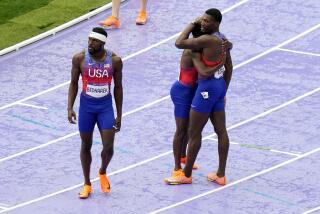Graddy Follows Davis Tradition--He’s Another Speedy Receiver
- Share via
For 75 meters, he led Carl Lewis in the 100 at the ’84 Olympics.
He beat Ben Johnson.
He won the silver medal.
Then, he won his gold medal when he led off the relay team that set the only world track record of the Los Angeles Olympics.
If no one knew his name, it was because Carl Lewis towered over the Los Angeles Olympics with his four gold medals.
But if Sam Graddy had not burst out of the chocks in the relay final that day in August of 1984, Lewis might not have won his fourth gold medal (tying him with Jesse Owens). Despite Carl’s blistering 8.94 finish that day, the most important part of any relay is the first leg. All Graddy had to do to get his team off in contention was hold off Ben Johnson, no less. That, Graddy took care of.
But Sam Graddy is used to being overlooked. He is used to people leaving one of the D’s out in his name. He’s used to running a decoy pattern--on and off the field. He is used to getting his hands on the football only a little more often than a linebacker.
He is the only Raider who has won Olympic gold and silver medals. But when he says he is on the team, their usual response is: “Oh, really? Do you know Marcus Allen?”
Sam Graddy is one of the few people in an NFL uniform who could probably have made as much money in another sport. In the little world of track and field, he was a valuable commodity. He was not Carl Lewis, but, as an Olympic runner-up and gold medalist, neither was he chopped liver. Lewis probably nets as much as a good NFL quarterback on the track and, as a “rabbit,” or even a serious competitor, Sam Graddy probably would have commanded sizable fees on the lucrative European summer circuits.
But Sam Graddy always wanted to be a football player. He was a “walk-on” in college (uninvited, unexpected, unscholarshipped, and even an unwelcome surprise on the practice field). He had been a tailback in high school but at 5 feet 10 and 160 pounds, he had no chance of making the University of Tennessee’s backfield.
He didn’t really need it. He had become a world-class track star almost in his spare time. He won the 100 in the NCAA meet. He set a world record in the 60-yard dash.
But while Carl Lewis and Ben Johnson were devoting their entire focus to their track careers, Graddy had one foot in two sports.
The nice thing about track is, you don’t have to get a headache or a torn nose for your money. If your legs give out, it’s not because some 280-pound tackle was making a wish with it.
Graddy’s speed was both a help and a hex. Coaches gladly stuck him in kickoff and punt situations. But they were loath to throw their own ball to him. In shorts, he was an exclamation point. In pads, he was a question mark. In his senior year, he caught three passes.
The Denver Broncos drafted him. But in two years there, including a Super Bowl appearance, he caught exactly one pass. He played only on special teams blunting (or blocking for) punt returns. That’s as big a waste of talent as having Joan Collins play a nun.
Fortunately for Sam Graddy, Al Davis is, so to speak, a speed merchant. Al loves speed. The Raider style of football is ballistic. Not for them, the long, boring overland route to the end zone. No attrition football. Davis, a longtime admirer of blitzkrieg tactics in war as well as football, yearns for the lightning strike, the getting behind the enemy, not going through him.
Davis almost founded his career recruiting the Pennsylvania sprint star, Angie Coia, and he has since been famous for bringing in Warren Wells, Cliff Branch, Lance Alworth. Davis loves the players who make other players wonder which way they went.
So when the Denver Broncos put Sam Graddy on the Plan B list (i.e., the unprotected roster), Davis didn’t hesitate. Al Davis could no more resist a silver-medalist sprinter than a bear a jar of honey.
For their part, Olympians have found the football field hard to resist, too. Bob Hayes, who won his gold medal at Tokyo in 1964 and was the first to run the Olympics in 10-flat, helped put the Dallas Cowboys in three Super Bowls, and was probably the most successful of the track species on the gridiron. But Tommie Smith, who won a gold medal at Mexico City in 1968, tried unsuccessfully for the Cincinnati Bengals, and Renaldo Nehemiah, probably the greatest hurdler who ever lived, effectively short-circuited his career by trying--unsuccessfully--to play for the San Francisco 49ers.
Nehemiah was breaking world records by the week in the hurdles but turned to pro football after the boycott of the 1980 Games. The subsequent wear-and-tear aborted his chances for the ’84 and ’88 Olympics--to say nothing of the appearance money that escalated in the track world in his absence. He never got his gold medal. And he never got the gold, period.
Sam Graddy feels he made the right career choice.
“All I need is the football,” he says, smiling.
He feels he got less than a full chance at Denver.
“I’m a game player, not a practice-field player,” he says. “John Elway lost confidence in me when I muffed a couple of practice passes.”
He did not muff the one thrown to him Sunday in the Raiders’ game against Seattle. It was in the middle of the second quarter. The Raiders had a 10-0 lead and the ball on their 48-yard line when quarterback Jay Schroeder faded back to pass. He heaved the ball toward the horizon. Somewhere out there, he knew, Sam Graddy would have outrun a cornerback and run under the orbital shot.
Sam had. He hauled the ball in on the one-yard-line for a diving, 51-yard reception. It broke Seattle’s back. On the next play, the Raiders scored and broke open the game.
It was only the sixth reception of the season for Graddy. But he doesn’t need the ball often. When he gets it, it is a crusher. Graddy’s catches are like bases-loaded home runs. They have a devastating psychological effect. They average 32.5 yards. Not your basic safety valves. Graddy goes down the field, ticking.
Even his decoys are serviceable. Because Graddy does not pull a defender a few yards off the action. He lures him a whole field away. No man running backward can run as fast as Sam Graddy running forward.
Sam has one gripe about his profession: “In this business, they time you for the 40. Hey, I’m just getting going at 40 yards!”
It’s that second 40--or 50, or 60--that the defenders have to worry about with Sam Graddy. Unless one of them is Carl Lewis, they have no chance.
More to Read
Go beyond the scoreboard
Get the latest on L.A.'s teams in the daily Sports Report newsletter.
You may occasionally receive promotional content from the Los Angeles Times.






